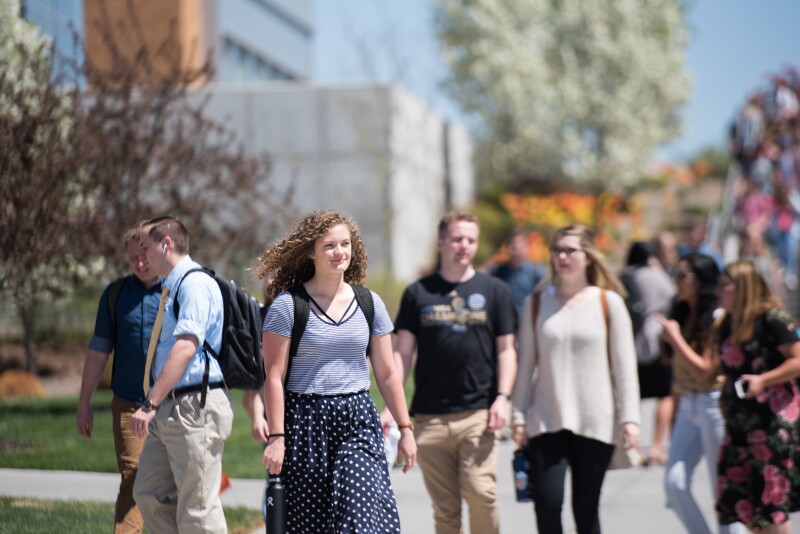CES Honor Code
The Church Educational System (CES) is sponsored by The Church of Jesus Christ of Latter-day Saints (Church) and directed by the Church Board of Education/Boards of Trustees, with the mission to develop disciples of Jesus Christ who are leaders in their homes, the Church, and their communities.
The CES Honor Code helps to accomplish the CES mission to build disciples of Jesus Christ. As faculty, administration, staff, and students voluntarily commit to conduct their lives in accordance with the principles of the gospel of Jesus Christ, they strive to maintain the highest standards in their personal conduct regarding honor, integrity, morality, and consideration of others. By accepting appointment, continuing in employment, being admitted, or continuing enrollment, each member of the campus communities personally commits to observe the CES Honor Code approved by the Board of Trustees:
- Maintain an Ecclesiastical Endorsement, including striving to deepen faith and maintain gospel standards
- Be honest
- Live a chaste and virtuous life, including abstaining from sexual relations outside marriage between a man and a woman. Living a chaste and virtuous life also includes abstaining from same-sex romantic behavior
- Abstain from alcoholic beverages, tobacco, tea, coffee, vaping, marijuana, and other substance abuse
- Participate regularly in Church services
- Respect others, including the avoidance of profane and vulgar language
- Obey the law and follow campus policies, including the CES Dress and Grooming standards
- Encourage others in their commitment to comply with the Honor Code and Dress and Grooming standards
CES Dress and Grooming Principles and Expectations
CES Dress and Grooming Principles and Expectations are part of the CES Honor Code and part of each student’s, employee’s, and volunteer’s commitment.
When considering Honor Code and dress and grooming decisions, the teachings of the prophets and apostles, as well as Church instruction, such as “For the Strength of Youth: A Guide for Making Choices,” can be helpful.
CES Dress and Grooming Principles

Each student, employee, and volunteer commits to:
- Represent the Savior Jesus Christ, the Church, and the Church Educational System
- Preserve an inspiring environment, without distraction or disruption, where covenants are kept in a spirit of unity so the Holy Ghost can teach truth
- Promote modesty, cleanliness, neatness, and restraint in dress and grooming
- Maintain an elevated standard distinctive to educational institutions of the Church of Jesus Christ
Dress and grooming expectations as in the examples below should align with these principles. However, application of these principles is not limited to the expectations listed. Members of the university community are expected to apply these principles to dress and grooming questions as they arise.
CES Dress and Grooming Expectations

- Dress for men and women should:
- Be modest in fit and style. Dressing in a way that would cover the temple garment is a good guideline, whether or not one has been endowed. Accommodation may be made for athletic participation.
- Be neat and clean. Sloppy, overly casual, ragged, or extreme clothing is not acceptable.
- Grooming
- Hair should be clean, neat, modest, and avoid extremes in styles and colors.
- Men’s hair should be neatly trimmed. Men should be clean shaven. If worn, mustaches should be neatly trimmed.
NOTE: BYU–Pathway Worldwide and Seminaries and Institutes of Religion match local Church dress and grooming standards as appropriate for local activities.
FAQs for Student Ecclesiastical Endorsements, the CES Honor Code, and Dress and Grooming Principles and Expectations
The Church Board of Education of The Church of Jesus Christ of Latter-day Saints announced updates to the Student Ecclesiastical Endorsement, the Honor Code, and Dress and Grooming Principles and Expectations for the Church Educational System (CES) on August 24, 2023. These changes were made to help students draw closer to Jesus Christ and strengthen the overall student experience. These adjustments will:
- adopt a principle-based approach, while retaining a set of common expectations;
- simplify and unify dress and grooming principles and expectations across CES campuses;
- better align the ecclesiastical endorsement interview with the ecclesiastical responsibilities of Church leaders.
The following are questions and answers about these updates.